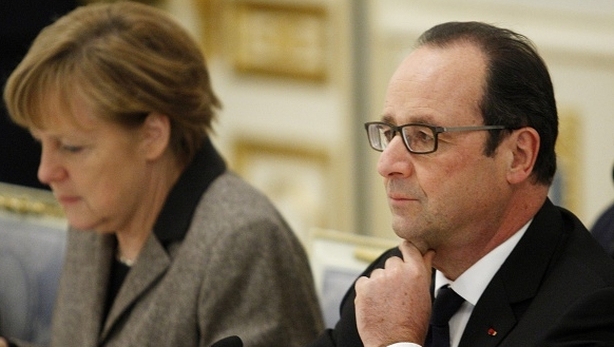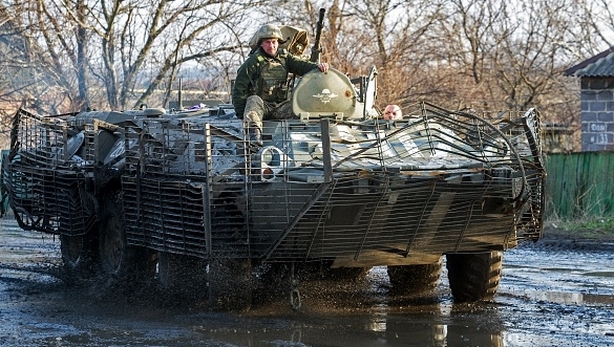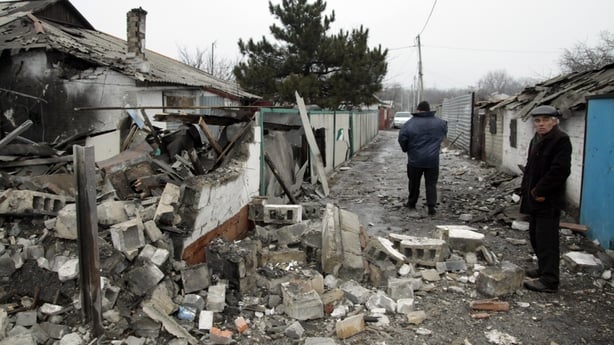Talks have concluded between the leaders of Germany and France and Russian President Vladimir Putin in an attempt to end the ongoing conflict in Ukraine.
A spokesman for Russian President Vladimir Putin said the talks were "constructive" and that work is under way on a possible joint document on implementing the Minsk Agreement.
The Kremlin spokesperson added the next contact between Russian, German and French leaders is expected to take place by phone on Sunday.
The coordinated trip by Chancellor Angela Merkel and President Francois Hollande for talks with Mr Putin followed five hours of late-night discussions with Ukrainian leader Petro Poroshenko in Kiev.
Asked by reporters in Paris how the talks went, President Hollande said: "It's the first step."
Chancellor Merkel, who is in Moscow for the first time since the conflict began, said it was unclear whether the meeting in Moscow would secure a ceasefire.

Their initiative follows fierce fighting and territorial gains in eastern Ukraine by Russian-backed separatists since a peace blueprint was agreed in Belarus in September.
The Ukrainian military reported that two more soldiers had been killed in the past 24 hours in the east, with 26 wounded.
The growing military pressure has shaken the Ukrainian economy and driven a debate over the possibility of the United States providing Kiev's hard-pressed army with arms.


A statement on President Poroshenko's website said the sides had expressed the hope that "Russia had an interest in" a peaceful settlement of the conflict.
For Moscow's part, Russia's ambassador to France Alexander Orlov told Europe 1 radio there was an urgent need to avoid war.
"I wouldn't say it's a last chance meeting, but it's not far off," he said.
The German, French and Ukrainian leaders had called for a quick ceasefire, withdrawal of foreign forces from Ukraine, the pull-back of heavy weapons and equipment, the closure of the border and the release of all prisoners.
On the ground, the rebels are advancing on a railway hub held by Ukrainian troops, who are almost encircled.
A collapse in Ukraine's currency further highlighted the importance of reaching a deal.
It lost nearly a third of its value yesterday after the central bank halted daily auction sat which it sold hard currency to banks.
Though details of the peace deal were under wraps, much might depend on whether Ukraine is being pressed to acknowledge existing front lines as the new negotiating reality - and whether Kiev would accept this.
German government sources said yesterday the key problem for resuming peace talks was that current front lines no longer tally with what was agreed at talks in Minsk, Belarus, last year.
One idea was that a new attempt at a ceasefire should take-in the current front lines, which reflect rebel gains, without Kiev having to give up its claim to these areas as part of the Ukrainian state.
German government sources continued to say however today that the Minsk talks last September were still the basis for negotiations - the view also of Kiev, France and the United States.
Ukrainian Prime Minister Arseny Yatseniuk said yesterday that Kiev would not consider any peace plan that cast doubt on the nation's territorial integrity, sovereignty or independence.
NATO says Russia has provided vital support to the rebels in the shape of weapons, funds and troops, something denied by Moscow.
Ukraine 'fighting for very survival': Biden
Meanwhile, US Vice President Joe Biden has said the United States and Europe must stand together over Ukraine.
He also criticised Russian President Vladimir Putin for riding roughshod over peace efforts.
"Ukraine is fighting for their very survival right now," Mr Biden told reporters alongside EU president Donald Tusk.
"Russia continues to escalate the conflict by sending mercenaries and tanks and, as we euphemistically say in the United states, little green men, without patches, very sophisticated special operations soldiers.
"President Putin continues to call for new peace plans as his troops roll through the Ukrainian countryside, and he absolutely ignores every agreement his country has signed in the past," he said.

